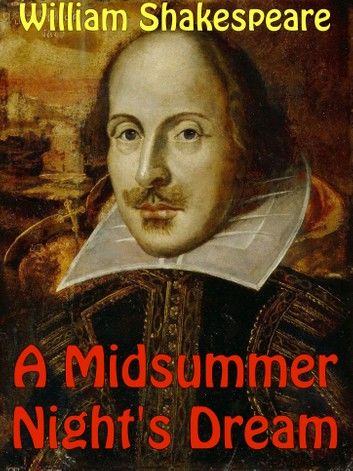| FindBook |
有 1 項符合
A Midsummer Night's Dream的圖書 |
 |
A Midsummer Night's Dream 作者:William Shakespeare 出版社:Castrovilli Giuseppe 出版日期:2014-01-22 語言:英文 |
| 圖書館借閱 |
| 國家圖書館 | 全國圖書書目資訊網 | 國立公共資訊圖書館 | 電子書服務平台 | MetaCat 跨館整合查詢 |
| 臺北市立圖書館 | 新北市立圖書館 | 基隆市公共圖書館 | 桃園市立圖書館 | 新竹縣公共圖書館 |
| 苗栗縣立圖書館 | 臺中市立圖書館 | 彰化縣公共圖書館 | 南投縣文化局 | 雲林縣公共圖書館 |
| 嘉義縣圖書館 | 臺南市立圖書館 | 高雄市立圖書館 | 屏東縣公共圖書館 | 宜蘭縣公共圖書館 |
| 花蓮縣文化局 | 臺東縣文化處 |
|
|
A Midsummer Night's Dream is a comedy play by William Shakespeare, believed to have been written between 1590 and 1596. It portrays the events surrounding the marriage of the Duke of Athens, Theseus, and Hippolyta. These include the adventures of four young Athenian lovers and a group of six amateur actors, who are controlled and manipulated by the fairies who inhabit the forest in which most of the play is set. The play is one of Shakespeare's most popular works for the stage and is widely performed across the world.
The play features three interconnecting plots, connected by a celebration of the wedding of Theseus of Athens and the Amazon queen, Hippolyta, which is set simultaneously in the woodland and in the realm of Fairyland, under the light of the moon.
In the opening scene, Hermia refuses to follow her father Egeus' instructions to marry Demetrius, whom he has chosen for her, because she wishes to marry another man named Lysander. In response, Egeus invokes before Theseus an ancient Athenian law whereby a daughter must marry the suitor chosen by her father, or else face death. Theseus offers her another choice: lifelong chastity while worshipping the goddess Diana as a nun.
At that same time, Peter Quince and his fellow players gather to produce a stage play, "the most lamentable comedy and most cruel death of Pyramus and Thisbe", for the Duke and the Duchess.[2] Quince reads the names of characters and bestows them to the players. Nick Bottom, who is playing the main role of Pyramus, is over-enthusiastic and wants to dominate others by suggesting himself for the characters of Thisbe, the Lion, and Pyramus at the same time. He would also rather be a tyrant and recites some lines of Ercles. Quince ends the meeting with "at the Duke's oak we meet".
Meanwhile, Oberon, king of the fairies, and his queen, Titania, have come to the forest outside Athens. Titania tells Oberon that she plans to stay there until she has attended Theseus and Hippolyta's wedding. Oberon and Titania are estranged because Titania refuses to give her Indian changeling to Oberon for use as his "knight" or "henchman," since the child's mother was one of Titania's worshippers. Oberon seeks to punish Titania's disobedience, so he calls for his mischievous court jester Puck or "Robin Goodfellow" to help him concoct a magical juice derived from a flower called "love-in-idleness", which turns from white to purple when struck by Cupid's arrow. When the concoction is applied to the eyelids of a sleeping person, that person, upon waking, falls in love with the first living thing they perceive. He instructs Puck to retrieve the flower with the hope that he might make Titania fall in love with an animal of the forest and thereby shame her into giving up the little Indian boy. He says, "And ere I take this charm from off her sight, / As I can take it with another herb, / I'll make her render up her page to me."[3]
Hermia and Lysander have escaped to the same forest in hopes of eloping. Helena, desperate to reclaim Demetrius's love, tells Demetrius about the plan and he follows them in hopes of killing Lysander. Helena continually makes advances towards Demetrius, promising to love him more than Hermia. However, he rebuffs her with cruel insults against her. Observing this, Oberon orders Puck to spread some of the magical juice from the flower on the eyelids of the young Athenian man. Instead, Puck mistakes Lysander for Demetrius, not having actually seen either before, and administers the juice to the sleeping Lysander. Helena, coming across him, wakes him while attempting to determine whether he is dead or asleep. Upon this happening, Lysander immediately falls in love with Helena. Oberon sees Demetrius still following Hermia and is enraged. When Demetrius decides to go to sleep, Oberon sends Puck to get Helena while he charms Demetrius' eyes. Upon waking up, he sees Helena. Now, both men are in pursuit of Helena. However, she is convinced that her two suitors are mocking her, as neither loved her originally. Hermia is at a loss to see why her lover has abandoned her, and accuses Helena of stealing Lysander away from her. The four quarrel with each other until Lysander and Demetrius become so enraged that they seek a place to duel each other to prove whose love for Helena is the greatest. Oberon orders Puck to keep Lysander and Demetrius from catching up with one another and to remove the charm from Lysander. Lysander returns to loving Hermia, while Demetrius continues to love Helena.
Meanwhile, Quince and his band of six labourers ("rude mechanicals", as they are described by Puck) have arranged to perform their play about Pyramus and Thisbe for Theseus' wedding and venture into the forest, near Titania's bower, for their rehearsal. Bottom is spotted by Puck, who (taking his name to be another word for a jackass) transforms his head into that of a donkey. When Bottom returns for his next lines, the other workmen run screaming in terror, much to Bottom's confusion, since he hasn't felt a thing during the transformation. Determined to wait for his friends, he begins to sing to himself. Titania is awakened by Bottom's singing and immediately falls in love with him. She lavishes him with attention and presumably makes love to him. While she is in this state of devotion, Oberon takes the changeling. Having achieved his goals, Oberon releases Titania, orders Puck to remove the donkey's head from Bottom, and arranges everything so that Hermia, Lysander, Demetrius, and Helena will believe that they have been dreaming when they awaken.
The fairies then disappear, and Theseus and Hippolyta arrive on the scene, during an early morning hunt. They wake the lovers and, since Demetrius does not love Hermia any more, Theseus overrules Egeus's demands and arranges a group wedding. The lovers decide that the night's events must have been a dream. After they all exit, Bottom awakes, and he too decides that he must have experienced a dream "past the wit of man". In Athens, Theseus, Hippolyta and the lovers watch the six workmen perform Pyramus and Thisbe. Given a lack of preparation, the performers are so terrible playing their roles to the point where the guests laugh as if it were meant to be a comedy, and afterward everyone retires to bed. Afterward, Oberon, Titania, Puck, and other fairies enter, and bless the house and its occupants with good fortune. After all other characters leave, Puck "restores amends" and suggests to the audience that what they just experienced might be nothing but a dream (hence the name of the play).
|










